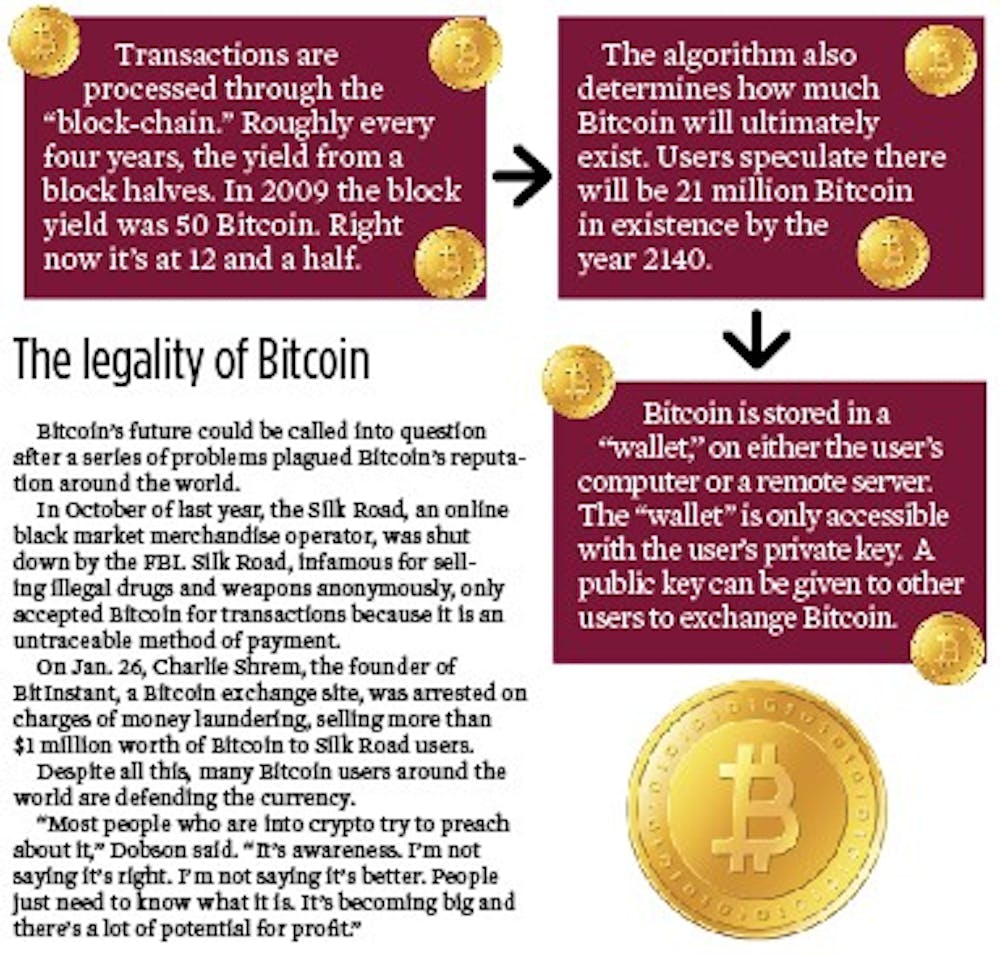New Money: Bitcoin is 'not on the radar' of CMU despite growing popularity
Two investments of $100 last July was all it took to pull Andrew Coutts and his friends down the rabbit hole of "cryptocurrency."
Created in 2009 by an anonymous Internet user, the cryptocurrency known as Bitcoin, quietly sprang up around the world. The digital currency began to change the way people did business, from buying tickets for sporting events to purchasing food.
Coutts, an Ohio senior, said Bitcoin is gaining traction worldwide, revolutionizing the way people think about currency and how it can be used.
“I equate it to the invention of the Internet," Coutts said. "This is the equivalent in the financial sector."
He and his friend Nick Dobson, a Grand Rapids senior, began with small investments into Bitcoin.
“(When) we started, we got a millionth of a Bitcoin,” Dobson said. “We started with little coins. And then we just started day trading.”
Originally, with modest goals of paying off their student loans, their journey into Bitcoin began.
There was just one problem.
Business markets around the world haven’t fully accepted cryptocurrency as a viable monetary unit.
Cumbria University in London began using Bitcoin in conjunction with some of its courses earlier this year, but the proposition is not likely at CMU, said Barrie Wilkes, vice president of Finance and Administrative Services.
“We've had no conversations about Bitcoin or accepting Bitcoin,” Wilkes said. “It's not on our radar right now.”
The only way it could be accepted by CMU is if it were regulated by an agency recognized by the federal government, Wilkes said.
The NBA's Sacramento Kings will begin accepting Bitcoin on March 1 for the purchases of game tickets and merchandise.
Bradley Wachler, senior associate athletics director at CMU, echoed Wilkes' sentiments about accepting Bitcoin.
“It's not something we're familiar with or something we've considered at this point,” he said.
Betting on cryptocurrency
A main concern about Bitcoin for CMU is its financial safety.
“I know there's been some concerns with its security, so that's always a concern for us,” Wachler said. “If it's consumer-friendly, that's what we're always focused on.”
Investors in cryptocurrencies are able to track the price around the world by watching five different markets in the U.S., Europe, Japan, China and Russia.
The price of Bitcoin and other cryptocurrencies fluctuates on any given day, similar to how stock markets fluctuate.
On Feb. 6, online retailer Bitcoin Shop became a publicly-traded company, the Wall Street Journal reported, making it the first Bitcoin-affiliated company to be found on the stock market.
The company became publicly traded to gain publicity as well as legitimacy, Bitcoin Shop CEO Charles Allen told the WSJ.
Dobson said the same financial trends used to analyze the stock market can be used to analyze the price of cryptocurrency.
“You can think of this, kind of crudely, as stocks, but they're not,” he said. “It's better to liken it to a currency exchange than a stock exchange.”
Elsewhere, Bitcoin has attracted real-cash investment.
Union Square Ventures, also an investor in Twitter, invested $5 million last May into Coinbase, a San Francisco-based company that allows its users to buy Bitcoin.
In theory, anything can be purchased with Bitcoin and other cryptocurrencies, but it's more of a commodity than a traditional currency right now, Dobson said.
For example, the complicated nature of Bitcoin makes it difficult for the everyday person to use it in the same way a person would buy groceries or textbooks.
“For now, I don't bother with people not in a computer science background,” Coutts said. “It's hard to explain to people. It's not really practical to go down the street and go to 7-Eleven and buy something.”
CMU Economics Club President and Marquette junior Ronald Klingler speculated that if regulation of Bitcoin at a federal level does occur, private colleges would have a better chance of using Bitcoin than public colleges.
However, Dobson said the lack of a federally recognized overseer and regulation of Bitcoin, as well as its anonymous nature – transactions cannot be tracked – is what makes Bitcoin alluring to certain people.
“It's the fact that governments can't touch it,” he said. “Our currency system is a joke. Nobody thinks it's a problem that everyday there's a person – a human being – at the tippy top that decides on a daily basis, 'let's print some more money.'”
Bitcoin solves this problem, Dobson said, by giving the currency's power to the people rather than to a centralized bank, such as the U.S. Federal Reserve.
Dobson said the government and large banks are afraid of Bitcoin because it is "a currency for the people and by the people."
Similarly to the way iconic Nintendo hero Mario collects coins – jumping fearlessly down pipes – Dobson's journey down the Bitcoin rabbit hole continues.
“I look at it like a video game where I have to get as many coins as possible,” he said. “The bonus is that it's real money.”
https://vimeo.com/86446892




